FEATURE IMPACT: Afa Husayn protects a tropical paradise
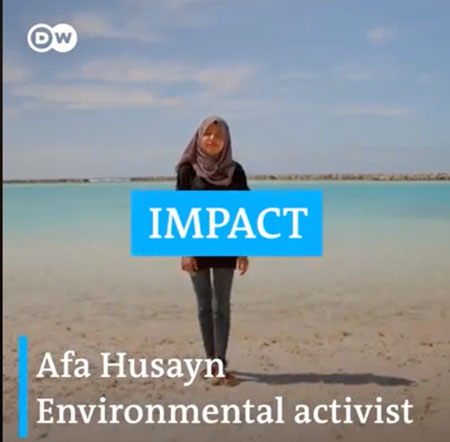
MALDIVES – We would be very happy to have a conversation to see how young environmental defenders in the Maldives can be helped to develop and establish themselves in this area, considering the climate vulnerability of the Maldives, our current climate crisis and the very much felt need among young people to engage effectively on this issue with stakeholders at all levels. Allow me to share this short video (above) by the German TV channel DW-TV, which produced a short video article on Afa Husayn from BeLeaf very recently.
A short video on the broader issue is available at the link below, which features some of our other advocates.VIEW HERE GLOBAL 'Our communities are risking their lives to defend our world.' A global call to action to stop violence and killings in supply chains
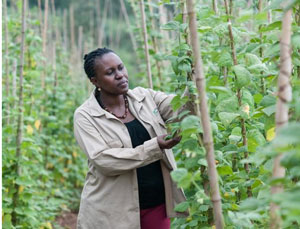
GLOBAL – Alongside the 8th UN Forum on Business and Human Rights in Geneva today, representatives from indigenous peoples, afro-descendent and peasant communities from 16 countries issued an urgent call for action – the Geneva Declaration. They are demanding governments and companies end the violence, killing and deliberate criminalisation of people defending their rights, their lands and their communities. ‘We wish to live free of violence and demand the respect for our lives and our rights! The government should not impose their visions of development on us.’ Indianara Ramires Machado, from Brazil’s Guarani-Kaiowà indigenous peoples, said today. Written by those who have seen first-hand what happens when destructive business activities are conducted with impunity at the expanding frontier of agricultural and extractive industries, the Declaration articulates the extreme challenges that they and their communities, families and peoples face. It offers practical recommendations for states, businesses, investors and others to ensure their rights are respected and protected. READ MORE Realizing the $1 trillion net benefit of protecting mangroves

GLOBAL – A new report from the Global Commission on Adaptation outlines what the world stands to gain if it invests in mangroves, and other adaptation efforts, to mitigate climate change According to Act Now: A Global Call for Leadership on Climate Resilience, “investing $1.8 trillion globally in five areas from 2020 to 2030 could generate $7.1 trillion in total net benefits. The five areas we consider are early warning systems, climate-resilient infrastructure, improved dryland agriculture, mangrove protection, and investments in making water resources more resilient. This represents only a portion of the total investments needed and total benefits available.” As the world aims for ambitious climate targets, the Global Commission on Adaptation makes clear that mangroves are part of the solution. READ MORE AFRICA Group associations could save Mangrove forests

KENYA – A study done by the Kenya Forest service reveals that increased demand for mangrove wood products is due to increased population, weak governance, inadequate awareness of the actual value of mangrove ecosystems, plus unmonitored illegal activities. These have led to loss and transformations of mangrove forests. The Mida Creek-based group, alongside others in the neighbourhood, is working to reverse this trend by cultivating and planting mangrove seedlings. They also sell seedlings to other conservation-oriented organisations for replantation elsewhere. Collecting the seeds and planting them in seedbeds by the sea, guarantees that there will be regeneration. The youth reportedly produce approximately 20,000 seedlings annually. Mida creek, states Kenya Forestry Services (KFS) officer Elvis Katana Fondo, is the oldest reserve of its kind in the East Africa region. READ MORE More than twenty years of evolution of Madagascar's mangroves

MADAGASCAR – This study was conducted by Save our mangroves now! It is an international initiative that mobilizes policy makers and supports environmental actors to stop and reverse the loss of mangroves. Save our mangroves now! has a particular focus in the Western Indian Ocean, which includes Madagascar. The WWF, the German Federal Ministry for Economic Cooperation (BMZ) and Development and IUCN are the leaders of this initiative and the authors of this cartography, available for download here. Based on cartographic analyzes and aerial photographs, the results of this study are about the evolution of Madagascar’s mangroves from 1995 to 2018. What we learn from these scientific analyzes? For the most part, mangroves are declining everywhere in Madagascar! The total surface of mangroves decreased from 294,387 ha in 2000 to just over 236,400 ha in 2018. Nevertheless, mangroves near marine or terrestrial protected areas are less impacted than others. Another important finding is that although the loss rates decreased over the years, the degradation increased. So, the degradation is the hidden loss. Also, and this is a milestone to this study, most of the areas where mangrove forests are managed by local communities are better in the whole country.READ MORE AMERICAS Mangrove forests in Colombia helping climate mitigation
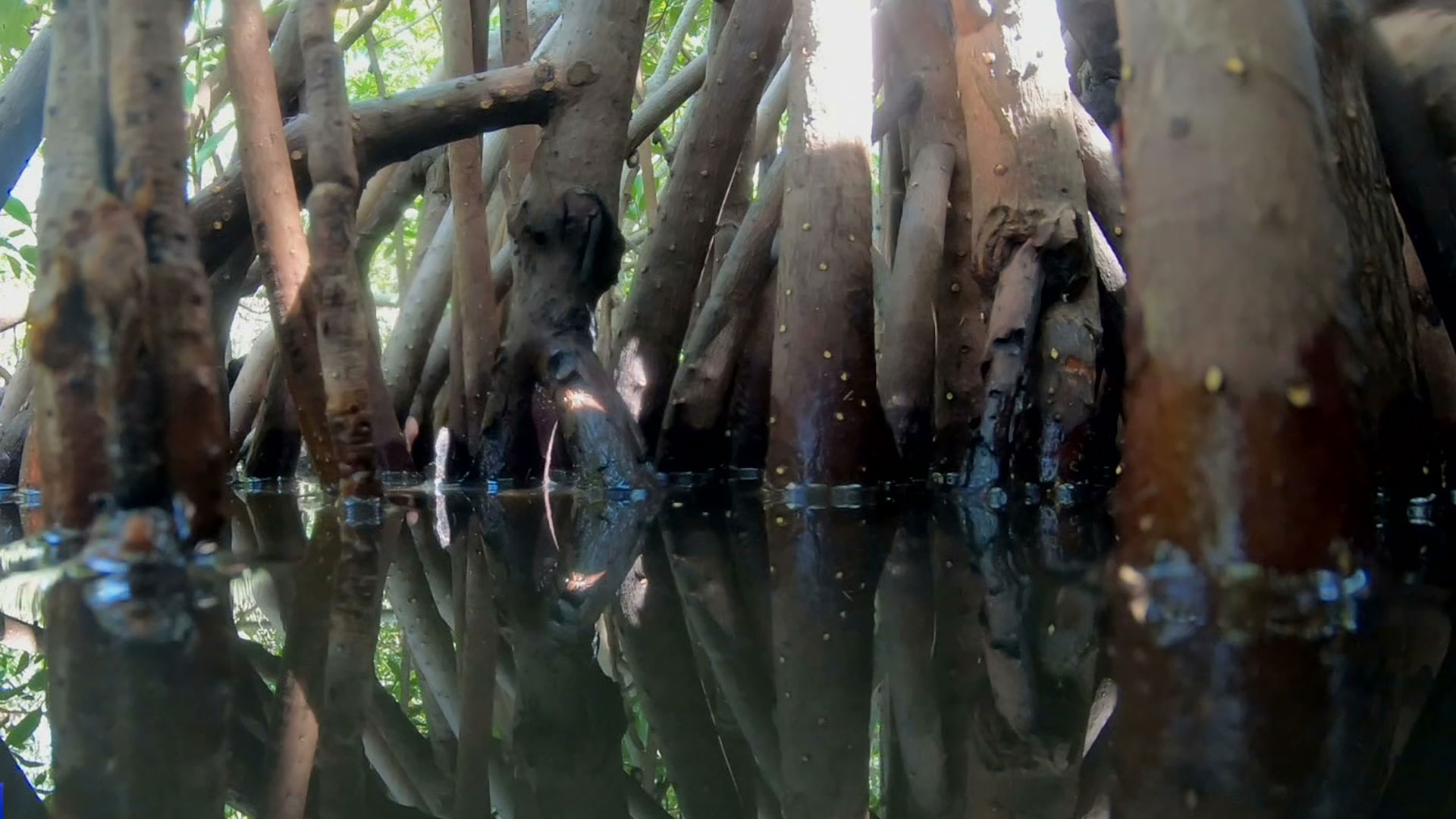
COLUMBIA – angrove forests, once linked to disease and insect pests, has now emerged as key ally in mitigating the effects of climate change like natural disasters. Colombian scientist Paula Sierra explains, "It provides a first line of defense along the coast. As you can see all of these roots, it can dissipate a wave. So when you have a mangrove along the coast and you have a strong current, the current hits the roots and the energy of the wave dissolves." Recent studies are showing mangroves role in climate mitigation goes even further. According to U.S.- based Conservation International, mangroves can store up to 10 times more carbon than land-based forests. They key is keeping them healthy. In a healthy mangrove, the carbon is trapped and locked away in the soil down below. However, in a mangrove that is destroyed, that carbon dioxide is released and that is what contributes to global climate change. For almost a decade, Colombia's Investigative Institute for Marine and Coastal systems – Invemar- has been studying these healthy Colombian mangroves. READ MORE Retired Texas shrimper wins record-breaking $50 million settlement
/https://static.texastribune.org/media/files/8ceb6aabbdb46a71b0a891a7e3f898e2/05_Formosa_Plastic_Pollution_EW.jpg)
TEXAS – U.S. District Judge Kenneth M. Hoyt approved the settlement agreement between a scrappy environmental coalition and plastics giant Formosa. The settlement is the largest in U.S. history resulting from a citizen environmental suit. A federal judge approved a historic settlement agreement Tuesday between Taiwan-based plastics manufacturer Formosa and a scrappy environmental activist represented by indigent legal services nonprofit Texas Rio Grande Legal Aid. TRLA said the $50 million settlement is the largest in U.S. history involving a private citizen's lawsuit against an industrial polluter under federal clean air and water laws. The money will be poured into a trust over the next five years and used to pay for programs supporting pollution mitigation, habitat restoration, public education and other environmental efforts on the middle Texas Gulf Coast. Diane Wilson, a retired shrimper and an environmental activist, sued Formosa in July 2017, alleging that its Port Comfort plant had illegally discharged thousands of plastic pellets and other pollutants into Lavaca Bay and other nearby waterways. READ MORE Mangroves, vital to many coastlines, are under threat

USA – Some mangroves are invasive, but many are vital coastline protectors. Their dense, firmly anchored root systems keep erosion from occurring during storms, and they filter water and provide shelter for marine life and other animals. The greenbelts also sequester carbon — the world’s mangroves sequester 75 billion pounds of carbon a year. But mangroves present plenty of worries. The plants are disappearing quickly because of human development, and over a quarter of Earth’s original mangrove forests have now been lost. Rising sea levels kill off mangroves — and as the climate changes and sea levels rise even more, losses could increase. Mangroves are considered a harbinger of climate change: As waters warm around the world, their habitat is shifting northward. That might bring more carbon sequestration and increasing shoreline protection. But rising waters have decreased the plants’ genetic diversity — and that could kill off mangroves as the planet warms. READ MORE ASIA Mass tree-planting projects go awry around the world
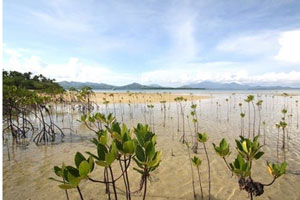
PHILIPPINES – From the Amazon to the Australian outback, the world’s forests are on fire. But just as all these trees disappear, politicians are sprouting promises to plant more of them like the dawning of a global spring. In the run-up to the UK election on December 12, Labour says it will plant two billion new trees on British soil by 2040 – that’s 100m a year. The Conservatives are pledged to 30m a year, while the Liberal Democrats say 60m. Perhaps the strangest efflorescence is Nigel Farage’s promise to persuade Donald Trump to lead a global afforestation campaign. These tree-planting pledges are certainly a step in the right direction, but there’s a problem. Everything being said is big on rhetoric but light on practicalities. As I know from many years of being involved with mangrove afforestation in the tropics, it’s a lot easier to plant seeds than it is to grow trees. So what lessons does the UK’s next government need to learn before it sends planters all over the countryside? READ MORE Rising Sea Levels And Disappearing Mangrove Forests Spell Trouble For Vietnam

VIETNAM – In Vietnam, the mangroves guard against dangerous salt water intrusions into farm land in the southernmost part of the Mekong Delta and also provide protection for a variety of wildlife. As Delta ecologist Nguyen Huu Thien explains, the Delta is the main food basket of Vietnam. It produces more than 50 percent of the country’s food, 90 percent of its rice exports, 65 percent of its fruit, and 75 percent of its fish, which are a major source of protein. The Delta still suffers from the impact of an ill-advised attempt by the Communist authorities after they took power in South Vietnam in the spring of 1975 to increase rice production there. In order to expand the space for rice production, the new rulers encouraged the destruction of the mangrove forests which had acted as a buffer to protect farm land from sea-driven salt intrusions. Add to this loss of mangrove forests the impacts of climate change and the upstream hydropower dams in China and Laos which have blocked much of the sediment that once reached the Delta and replenished it with nutrients, and you have a disaster in the making. READ MORE Mangroves Help Fight The Effects Of Climate Change. So Why Is Mumbai Destroying Them?

INDIA – Bare trees with slender branches line a half-built highway overpass in eastern Mumbai. These are mangroves, trees or shrubs found in tropical swampy marshland with roots that grow above the ground. But construction has blocked their lifeblood — salt water. Their aerial roots poke through dry, caked mud instead of brackish water. Environmentalist B.N. Kumar points to a small channel under the highway where seawater once entered the mangrove patch. It's now littered with rocks and construction debris. "All the mangroves, about 5,000 of them, have dried up. They can only be used as firewood now," Kumar says. "It's very sad to see these mangroves dying like this. At a time when we require more and more mangroves, we are destroying, unfortunately, more and more mangroves," Kumar says. Studies show that Mumbai lost nearly 40 percent of its mangroves between 1991 and 2001 — about 9,000 acres. And rapid urbanization continues to threaten them. READ MORE OCEANA Healthy mangroves help coral reef fisheries under climate stress
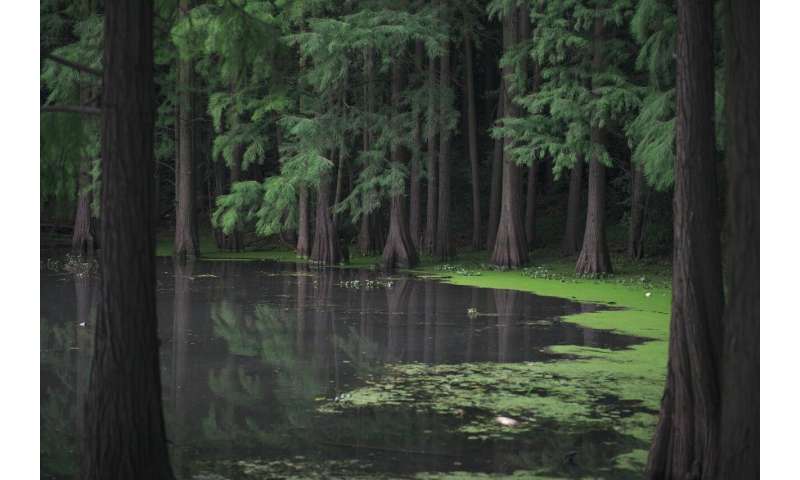
AUSTRALIA – Healthy mangroves can help fight the consequences of climate change on coral reef fisheries, according to a University of Queensland-led study. UQ's Professor Peter Mumby said corals have been bleached and reefs have lost their structural complexity as a major consequence of warming seas. "Many people are worried that—due to climate change—reef fishery yields could halve if coral reefs flatten, losing the hiding places that support thousands of fish," he said. "When a young fish arrives at a degraded reef it has nowhere to hide and is easily targeted by predators. "Of course, predators experience the same problem when they're young, so the entire food web becomes unproductive and few fish survive." Despite the alarming trend, the team found mangroves provided a partial solution. "We know that many reef fish can use mangroves as an alternative nursery habitat to the reef," Professor Mumby said. "Mangroves provide a calm, safe environment with plenty of food and allow fish to grow larger before heading out to the reef as adults. READ MORE LAST WORD Great Gift For The Holidays MAP's 2020 Children's Art Calendars are now available. These make great gifts to show your support of global climate efforts and are a helpful reminder for what we can do to assist in saving our world’s mangroves. Use the donation form below to select your calendar order, and receive a tax-deductible receipt for doing so – thank you! (Note: All costs include the cost of shipping – please select whether you will be shipping to a US or International address for according pricing. 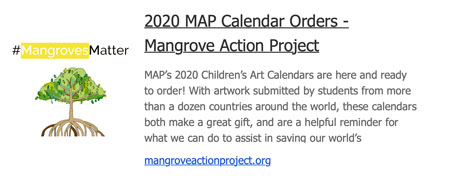 CLICK HERE
Like this newsletter?
Pease consider donating to MAP to keep it going.
Giving could never be easier | ACTION ALERTS TROPIMUNDO 2020-2021 applications is now open TROPIMUNDO is an EC-funded and excellence-labelled Erasmus Mundus Joint Master Degree in Tropical Biodiversity and Ecosystems. MORE INFO PETITION – NO new coal power – protect local people and wildlife!
SIGN OUR PETITION PETITION – Help stop the advance of oil palm plantations in Gabon!
SIGN THE PETITION PETITION – Don't trash coral reefs for the cruise industry! – TAKE ACTION PETITION – Sea turtles or condominiums?
Sand mining and construction work would wipe out a marine biodiversity hotspot and destroy the livelihoods of local people, who have not been consulted. Please SIGN! PETITION – Save Penang! Reject the 3-Islands Reclamation!
The lack of public consultation and detailed information about the project is shocking in view of the size of proposed reclamation which is 4,500 acres or 7 square miles
PLEASE SIGN
PETITION – Save Pulau Kukup National Park – second largest mangrove island in the world. Sign The Petition Like this newsletter? Pease consider donating to MAP to keep it going. Giving could never be easier 
69 million tons of carbon stored thanks to mangrove restoration, as demonstrated by the new Mangrove Restoration Map VIEW MAP HERE 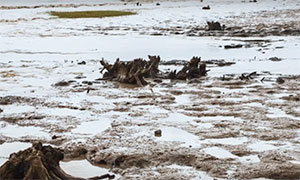
Restoring The Natural Mangrove Forest
Watch movie 
Community Based Ecological Mangrove Restoration in Rufiji Delta VIEW VIDEO Video: Mangroves for the Future – A look bacK. As the latest phase of Mangroves for the Future (MFF) draws to a close, this video highlights some of the project’s most successful initiatives – from local women supporting national park management in Viet Nam to an island in the Maldives that has become a model for waste management, and everything in between. View Here WANT TO GET INVOLVED?
Follow and Join MAP!
   
Like this newsletter? Pease consider donating to MAP to keep it going. Giving could never be easier 

VOLUNTEER OPPORTUNITY 
MANGROVE ISSUES Want to learn more about mangroves?
Our short presentation will give you a better understanding of the issues we are working to solve. WATCH PRESENTATION What is CBEMR? Easy to follow fact sheet – CLICK HERE What is EPIC? – The Ecosystems Protecting Infrastructure and Communities (EPIC) project: the role of ecosystems as protective barriers against climate induced hazards MANGROVES APP AVAILABLE
A pictorial field guide for easy identification of various mangrove species and learning about the mangroves ecosystem. CLICK HERE View MAP’s uploaded Videos at MAPmangrover’sChannel
Question Your Shrimp Consumer/Markets Campaign!
WATCH VIDEO Mangrove Restoration in Asia – Watch Short Video The Value of Mangrove Forests View Video CBEMR Experience Exchange MAP 2017 English Subtitles
VIEW THE VIDEO Mangroves: Guidebook to Malaysia – Click Here
Mangrove rehabilitation in Asia – Local Action and cross-border Transfer of Knowledge for the Conservation of Climate, Forests and Biodiversity VIEW VIDEOS HERE SHARE MAP'S VISION
CLICK HERE to watch short introductory video. Together we can work "at the roots of the sea". Our short documentary, Reducing the Risk of Disaster through Nature-Based Solutions : Mangroves
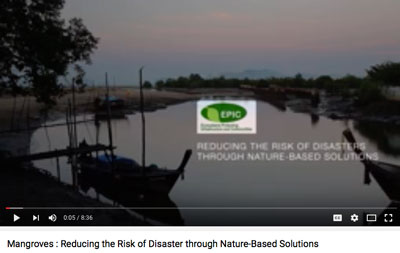
Exclusive Interview with Alfredo Quarto, Co-Founder and Executive Director of Mangrove Action Project – See more
Marvellous Mangroves Curriculum The Marvellous Mangroves Education Forum is an online hub for those utilizing the Marvellous Mangroves (MM) Curriculum. It gives students, teachers and anyone interested in mangroves, the opportunity to learn and share ideas themed around the curriculum, to connect and communicate with others around the globe whilst exploring mangroves from your computer or on the go. VISIT 
The award-winning Marvellous Mangroves (MM) curriculum educates children on the importance of mangroves and their ecological functions, teaching them about modern challenges and mechanisms for sustainability. VIEW VIDEO Marvellous Mangroves Curriculum in Bangladesh – WATCH VIDEO
MARVELLOUS MANGROVES IN BRAZIL
En Portuges 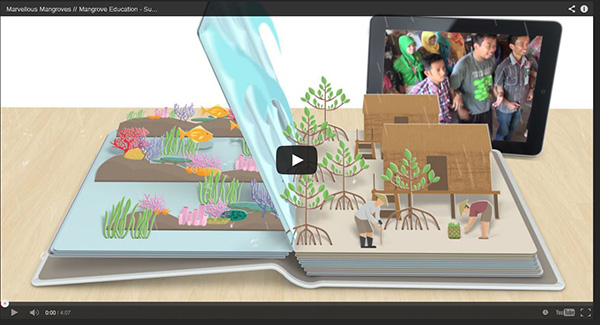
Marvellous Mangroves – A Curriculum-Based Teachers Guide. FOR MORE ON MAPs AWARD WINNING CHINA MANGROVE CURRICULUM VISIT

VIMEO SHOW
VISIT OUR "MM" WEBPAGE Check out our presentation for more details on Marvellous Mangroves Read this 10 page history of the development of MAP’s educational curriculum VIEW DOCUMENT
Article in Canada's Green Teacher Magazine – Read More
Like this newsletter? Pease consider donating to MAP to keep it going. Giving could never be easier 
Green Planet Fundraising Assists MAP – LEARN MORE
Volunteer Opportunities with Mangrove Action Project CLICK HERE
"Question Your Shrimp" Campaign Question Your Shrimp- Don't Buy or Sell Imported Tropical Shrimp! Sign the Petition Learn more about the affects of the shrimp industry on mangroves by visiting our blog
Editor’s Note: Mangrove Action Project’s Executive Director, Alfredo Quarto was interviewed about shrimp by Green Acre Radio’s Martha Baskin
LISTEN TO INTERVIEW Sign the Consumer's Pledge to avoid imported shrimp
Not yet a MAP News subscriber?
Click here to subscribe. Note to Our Readers: We strive to keep active links in our newsletter. However, due to circumstances beyond our control, occasionally links to stories may become broken. If you find a link to a story is not functioning, please cut and paste the headline into your browser search bar. In most cases you should be able to locate the original story.
|








/https://static.texastribune.org/media/files/8ceb6aabbdb46a71b0a891a7e3f898e2/05_Formosa_Plastic_Pollution_EW.jpg)



















